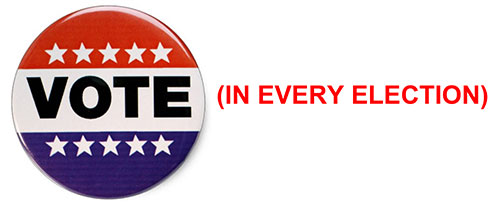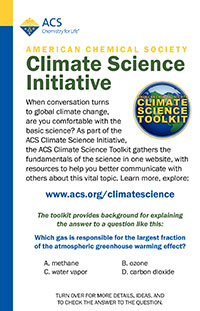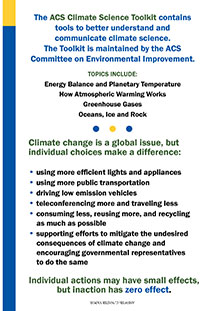Climate Science Concepts Fit Your Classroom
The First Earth Day Wisconsin's Changing Climate Communities in Wisconsin are feeling the widespread impacts of the changing climate and are starting to take action to protect themselves from future changes. This detailed report from the Wisconsin Initiative on Climate Change Impacts (WICCI) both illustrates these changes and proposes solutions to make communities more equitable and climate-resilient in the future. 2022 Sea Level Rise Technical Report Climate Change 2022: Impacts, Adaptation and Vulnerability The Single Best Guide to Decarbonization I’ve Heard
|
||||
|
|
||||
Climate is always changing—now it’s us
|
||||
Addressing Climate Change at the 2018 Wisconsin Science Festival Prof. Shakhashiri's Presentation Slides Periodically, we will be updating the anonymous comments posted above.
|
||||
Carbon Dioxide The Chemistry of Autumn Colors Greenhouse Gases & Climate Change |
||||
Renew the Blue: A Community Guide for Cleaner Lakes & Beaches in the Yahara Watershed Renew the Blue: A Community Guide for Cleaner Lakes & Beaches in the Yahara Watershed is the culmination of 2.5 years of planning and community engagement. Led by a cross-sector “compact” of diverse groups, the initiative seeks to drive further progress toward cleaner, healthier lakes. By spotlighting a more participatory path forward, all of us are called upon to be a part of the solution by adopting a new water ethic. Renew the Blue points to specific actions that, if collectively implemented, will unleash the untapped potential of our lakes in ways that have so far proved elusive. We invite you to join us and play an important role in this community renewal effort. While our individual actions may seem small on their own, we know they are cumulatively powerful in shaping the world as we’d like to see it. |
||||
Climate change is already bad, butwe can still fix this problem Carbon Dioxide Levels Have Passed a New Milestone Art and climate science collide at San Francisco’s Exploratorium I'm a Climate Scientist. I'm Not Screaming Into the Void Anymore. Scientists: Atmospheric carbon might turn lakes more acidic Key climate change numbers for 2022 Let’s Not Pretend Planting Trees Is a Permanent Climate Solution Report: Scales tipping against walleye; time to get hooked on new fish Q&A: Limnologist Hilary Dugan warns of warming Madison lakes Using Science and Celtic Wisdom to Save Trees (and Souls) How to Talk About Climate Change Across the Political Divide Can We Find a New Way to Tell the Story of Climate Change? The effects of climate change Net Zero by 2050 — A Roadmap for the Global Energy Sector Climate Change Indicators in the United States Why Bitcoin is Bad for the Environment The Science of Climate Change Explained: Facts, Evidence and Proof A Climate Change Guide for Kids Winter is Alive! lights up Madison with art about climate change Science mom: UW scientist joins campaign to teach fellow mothers about climate change Belching Cows and Endless Feedlots: Fixing Cattle’s Climate Issues Bringing the chill of the cosmos to a warming planet New England’s Forests Are Sick. They Need More Tree Doctors. Climate Disruption Is Now Locked In. The Next Moves Will Be Crucial. How Climate Migration Will Reshape America It’s not just cars that make pollution. It’s the roads they drive on, too. The Rise of Environmental Justice Earth’s climate destiny finally seen more clearly Profiles: The Catastrophist The Great Climate Migration Has Begun Overlooked No More: Eunice Foote, Climate Scientist Lost to History Ice watcher: climatologist carries on 165-year tradition on Madison lakes New weather ‘normals’ show how Madison’s climate has changed over 40 years I’m a Climate Scientist Who Believes in God. Hear Me Out. Meat Is Murder. But You Know That Already. Do We Really Have Only 12 Years to Avoid Climate Disaster? How We Respond 3 Billion Birds Gone CO2 emissions (metric tons per capita) Greta Thunberg to Attend New York Climate Talks. She’ll Take a Sailboat. Industrial ammonia production emits more CO2 than any other chemical-making reaction. Climate Change Poses Major Risks to Financial Markets, Regulator Warns Project: Murky Waters Introduction to Our Changing Climate Resilience of Yellowstone’s forests tested by unprecedented fire Nature’s Dangerous Decline ‘Unprecedented’; Species Extinction Rates ‘Accelerating’ How Does Your Love of Wine Contribute to Climate Change? Climate Change is Affecting Our Health. Is There a Cure? Most Teachers Don't Teach Climate Change; 4 In 5 Parents Wish They Did When Global Warming Was Revealed by a Zig-Zagged Curve Two New Books Dramatically Capture the Climate Change Crisis Britain (Yes, Rainy Britain) Could Run Short of Water by 2050, Official Says When Warren Washington created the first climate model, he had no idea how necessary it was. Ancient poop helps show climate change contributed to fall of Cahokia Why the future of oil is in chemicals, not fuels IN MEMORIAM: WALLACE BROECKER Extreme cold increasingly rare for Wisconsin, but polar vortex could be more common in warmer climate Reddit competes to visualize Madison’s prized Lake Mendota ice data Wisconsin joins state-led effort to implement Paris climate accord policies The Tiny Swiss Company That Thinks It Can Help Stop Climate Change Climate Change Could Leave Thousands of Lakes Ice-Free If the Earth Is Warming, Why Is It So Cold Outside? As the climate warms, tens of thousands of lakes may spend winters ice free Industrial Agriculture, an Extraction Industry Like Fossil Fuels, a Growing Driver of Climate Change Annual water use in Madison drops by a billion gallons in six years Greenland’s Melting Ice Nears a ‘Tipping Point,’ Scientists Say Climate Change's Giant Impact on the Economy: 4 Key Issues With fire, warming and drought, Yellowstone forests could be grassland by mid-century Antarctic ice sheet could suffer a one-two climate punch Bucking trend, Wisconsin utilities burned more coal in 2017; Ocean Warming Is Accelerating Faster Than Thought, New Research Finds 2018 ends as second-wettest year recorded in Madison Going Nowhere Fast on Climate, Year After Year Humans may be reversing the climate clock, by 50 million years The Planet Has Seen Sudden Warming Before. It Wiped Out Almost Everything. Changing evangelical minds on climate change The World Needs to Quit Coal. Why Is It So Hard? Climate Change Is Already Hurting U.S. Communities, Federal Report Says Confronting the Challenges of Climate Change How Extreme Weather Is Shrinking the Planet Rural America’s Own Private Flint: Polluted Water Too Dangerous to Drink More than 2 billion people lack safe drinking water. That number will only grow. Startling new research finds large buildup of heat in the oceans, suggesting a faster rate of global warming Sports Videos Give Clues to Climate Change Project Drawdown The Weather Guys The Bearded Seal My Son May Never Hunt Planet has only until 2030 to stem catastrophic climate change, experts warn Florida Is Having a 10-Month Streak of Toxic Red Tide Nitrous oxide from Tibetan permafrost packs global warming punch Can Plants and Trees Change the Weather? Climate Change Is Killing the Cedars of Lebanon Why We Need a More Activist Academy Assessment of methane emissions from the U.S. oil and gas supply chain Joe Parisi: Area Lake Flooding is Climate Change Issue That Should Catch Attention We Aren't Teaching What Students Need to Know About Climate Science Ask the Weather Guys: Climate Change is altering lakes and streams, study suggests Ask the Weather Guys: Rising Threat 2017: The Year in Climate Climate Change is Here: Massive Government Report Says Climate is Warming and Humans Are the Cause Happy Summer Solstice! Here's a guide to the longest day of the year.
ACS Public Policy Statement on Climate Change ACS Climate Science Toolkit:
|
||||
2019 WSST Conference The climate is changing: Friday, March 8, 2019 Instructors: Engage in hands-on activities and discussion you can use to introduce climate science concepts into the topics you already teach. Climate science is complicated, but it is based on fundamental concepts from our more familiar sciences. So the complexity offers opportunities to integrate climate science into teaching the concepts already included in your courses. This workshop is designed to help you see how to fit climate science into what you are already doing. The hands-on activities focus on the properties of water (including phase change, heat capacity, solubility, and acid/base chemistry) and how these properties of Earth’s bodies of water are affected by human-caused increases in atmospheric greenhouse gases, especially carbon dioxide, and the resultant global warming. Many of the activities will be directly usable or easily adaptable for use in your classroom. All the written and projected materials will be available to you electronically for use in your classrooms. |
||||
 |





